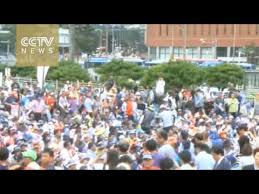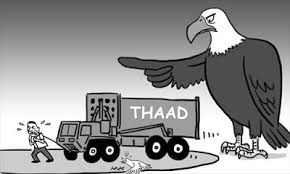South Korea, in particular, could take a leaf from Japan's playbook on preparing for a face-off and making the right structural reforms.
Most of us should have been ready for it, since the man had been more than clear about backtracking on America’s global trade policies. And now, in one flamboyant gesture, he has overturned his predecessor Barack Obama’s decision to join the TPP.
As one of the key members, Japan is up in arms. Prime Minister Shinzo Abe has vowed he would continue to try and persuade President Donald Trump.
At the same time, Tokyo appears to be quite ready to face the new threat.
Japan is a country that downplays the number of naval destroyers it has in order to keep its frenemies in check, and to assure them it still has a long way to go in terms of military defense. In reality, Tokyo is armed with seemingly worn-down subs that can actually be made battle-ready at a moment’s notice.
The Abe Shinzo administration has been ready to face off with Trump for a while now, and internal government sources say the foundations have already been laid. Prime Minister Shinzo Abe has already put in motion the necessary structural reforms to wean Japan off of the US or make Japanese firms more competitive in the face of high tariffs. Abe is also preparing to enlist the support of high-profile companies such as Softbank, which has been pledging more investment in America.
Further, Japan is looking to cut loose from China, which has made it clear it won’t play into US hands.
In contrast to Japan and China, South Korea has a smaller say. But that does not mean it has less on the line.
The country stands as the world’s 11th-largest economy in terms of GDP, but it also depends on exports for more than two-thirds of it. So any policy decisions by its chief trade partners are bound to have a profound impact -- even more so now that its internal economic affairs are in a mess due to the ongoing impeachment. South Korea truly cannot afford to have its global partnerships jeopardized.
During his presidential campaign, Trump has already called the US-Korea FTA a failed partnership that has robbed the US of 100,000 jobs.
The Seoul government should have long been brainstorming a strategy to keep the deal on track, and must readily communicate its plans with the public before the concerns mushroom into something bigger.
The alliance with the US goes far beyond military issues, and the significance should not be downplayed or tainted in any way if Korea is to continue pursuing its national interests.
The strategy should be laid out in such a way to prevent Koreans from harboring unnecessary ill sentiment toward the US, and vice versa. For this, both governments will have to cooperate seamlessly. Trump must realize the contribution that Koreans and the Korean economy are making in the US.
That while it may not be comparable in size to other nations such as Japan and China, there is no going around the fact that in the end, cliche has it may sound, it is indeed a global economy.
Korean firms should take a cue from Softbank and find ways they can offer more support for the Korean economy as it faces the aftershocks of Trump’s latest policy move.
As for the US, it must remember that Korean companies like Hyundai, Samsung and LG have been seeking cheaper entry into the US for years via countries like Mexico and Vietnam.
The change of a regime must not pull the plug on these efforts for the sake of global partnership. And needless to say, the products and services brought into the US also help create livelihoods there, and give Americans what they need.
All of this should not be forgotten or put on a back burner. As already witnessed in the Lehman Brothers meltdown, the intricate web of global trade and finance ensures that the demise of a single company can affect so many more.
But, in a weird and twisted way, I do envy the American people. Sure, there could have been someone better than Trump, who psychologists have branded as narcissistic and delusional.
But for many Americans, Trump is doing what they have only dreamed of doing and saying. To say out loud, that they think America is the best, that they are scared of anyone appearing to infringe upon its beliefs and interests, even at the expense of other nations and peoples. To say that the US won’t play the peace-brokering leader who is constantly mindful of others, including rivals. To say, the US will start acting only for its benefit-regardless of how short-sighted this may be.
To have a president, as strange as he may be, who for now, appears so committed in his campaign, does draw an odd contrast with our embattled President Park Geun-hye who now seems anxious only to cover her own tail.
In some ways, they are similar in that they seem to prioritize themselves. But at least for now, Trump is giving many Americans the promise they need, as twisted or unorthodox his methods may be.
 In a similar fashion, but based on a strategic and acceptable approach, Korea should be ready to protect its interests and its people amid the fast-changing global order. And all other players in the economy must be ready to lend a helping hand.
In a similar fashion, but based on a strategic and acceptable approach, Korea should be ready to protect its interests and its people amid the fast-changing global order. And all other players in the economy must be ready to lend a helping hand. By Kim Ji-hyun
By Kim Ji-hyun
Kim Ji-hyun is The Korea Herald’s Tokyo Correspondent. The views expressed here are entirely the writer’s own.

Related posts:
 THAAD will not protect ROK but cripples UN unity on NK ...
THAAD will not protect ROK but cripples UN unity on NK ...
Related posts:
Jul 22, 2016 ... Thousands of South Koreans from Seongju county gathered in Seoul to protest
against the government's decision to deploy a U.S.-built THAAD ...
Aug 11, 2016 ... However, the US and South Korea went too far and made use of North Korea's
nuclear threat to deploy THAAD, which will cause great harm to ...
Nov 13, 2016 ... South Korea's president said tragedy and “loneliness” drove her to rely on ...
More than 2,000 people from Seongju county, where one THAAD ...

